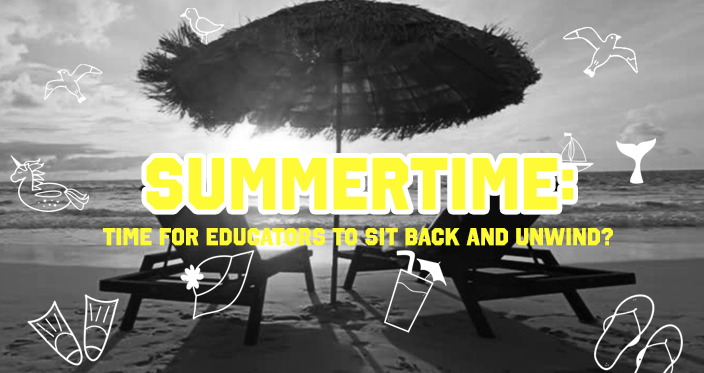
While teachers across the country have left the classroom for the summer, ready to unwind, the Flamboyan training team is ramping up to deliver professional development to hundreds of educators across Washington, DC over the warmer months. We know not everyone gets a break, but for those who are wondering what to do with all of your free time this summer, remember that it’s a great time to recharge and catch up on self-care, check in with your previous students and lay the groundwork for relationships with your new ones. Here are five things to keep in mind as you watch your popsicle (or margarita) melt in the DMV summer heat…
1. Self-care matters
Real, genuine, nourishing self-care is a critical component to any educator’s practice. It’s no accident that teaching is commonly referred to as an “act of love.” It takes emotional, intellectual, psychological, physical and spiritual investment and labor. This is amplified for the educators of students living in or experiencing trauma; secondary trauma can manifest in many ways. A lot of educators find themselves running on fumes toward the end of the year… counting down the days, drinking copious amounts of coffee, finding creative excuses for extending recess “just 15 more minutes,” planning extra field trips… sound familiar? As the saying goes, you can’t pour into someone else’s cup if yours is empty. Be sure to take some time for yourself to rest, replenish, and develop some strategies that will help you remain balanced in the coming year.
2. Relationships don’t quit
At our core, humans have a need to connect. And within the context of connection, we have a need to find common ground, to be validated, and to feel safe, supported and seen. This is as true for children as it is for adults. As your students move on to a new grade with a new teacher and they may have questions and anxiety about this transition. Help bridge the transition by reaching out (“Just calling to say ‘hi,’ and see if you have any questions about the upcoming year”), sharing updates (“We’re getting new chairs for the auditorium this summer!”) or providing appreciations (“I really appreciated your commitment to community this year; you were a great friend to your classmates and I’m excited for you to continue building those relationships next year in second grade!”). Help foster that critical sense of belonging to the school community for your children and their families by being a relational bridge this summer.
3. Reflections never end
We talk a lot about showing up with authenticity and vulnerability in our relationships, but what does this look like in practice? Be a constant learner in and from your community. If you don’t live in your school neighborhood, take some time to do a walking tour of the area this summer. Find out what your kids walk past on their way to school. Learn their bus routes. Experience their environment. If you show up with a genuine desire to connect (see above) and learn about the beauty and strength of the community, you will start the school year with a deeper appreciation for the humanity around you. In addition, you may want to ask yourself some of the following questions to ensure you’re consistently checking in on your implicit biases and the influence that they have on your relationships/teaching:
- Have I made any assumptions about my children and their families this year? When I don’t have all the information, do I create a story in my head, apply generalizations based in stereotype, or do I seek to understand?
- Have I fostered relationships with colleagues across lines of difference (i.e. racial, gender, sexuality, age, years of service, religion, etc)?
- What parts of my identity am I most aware of during the school day? What parts of my children’s identities am I most aware of?
- How do my core values, experiences, and beliefs impact the way I “show up” as an educator?
4. Avoid the summer slump
Just like we send material home with our kiddos to help prevent academic “back-sliding” during the summer, use this time to prepare. Beef up your academic partnering arsenal with new and creative ways for families to support learning at home. Explore different communication apps, browse the web for free downloadable games and activities or call a friend or two and see if they’d be down for a night of pizza and crafting!
5. Start embarking on those new home visits!
Teachers and families who have experienced effective family engagement agree that building authentic, individualized relationships with the family of every child ensures a strong foundation for ongoing partnerships throughout the school year. Go ahead and make those welcome phone calls! And if you’ve been trained on the practice, start scheduling visits with your students’ families. Remember, you’re not alone – it can be awkward to reach out to someone new and ask to visit their home – parents are nervous, too! As always, check your biases at the door and remember the core components of a home visit. As a refresher…
There are two types of bias:
Explicit biases are the things we know and aren’t afraid to share with the world. It’s what we post on our social media and discuss at dinner parties; these are the beliefs, attitudes, and preferences that we endorse at a conscious level. Implicit bias is a little trickier, because we don’t always know it’s there. Our implicit biases are like the part of the iceberg under the water’s surface; they are a preference/reaction based on our identities and experiences, exposure to societal messages and cultural images, and/or associations with in-groups that shape the way we receive, perceive, process, and respond to information in our environment. As Verna Myers explains in a popular TEDTalk, “…biases are the stories we make up about people before we even know who they actually are.”
Home visit guidelines:
- The purpose of a home visit is to build a relationship with your student’s family;
- Home visits are not conducted on school grounds;
- Home visits are voluntary for teachers and parents;
- Home visits should not stigmatize students;
- Home visits are scheduled in advance;
- Home visits are conducted in pairs.
To all of the educators reading this, take good care of yourself this summer! Relax. Recharge. Get back to you. Then when you’re ready, start laying the groundwork for you and your students to have an amazing next school year! Remember, relationships don’t quit!

Katherine Avery is the Senior Director of Educator Development on our Effective Family Engagement team in our Washington, DC office. Learn more about her at https://flamboyanfoundation.org/team_members/katherine-avery/.